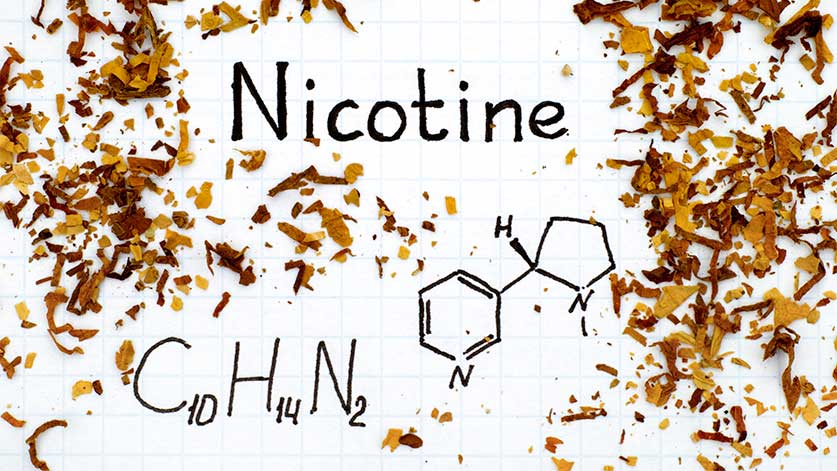Nicotine Facts, Effects, & Dependence
Nicotine is a stimulant drug produced by tobacco plants. It is widely abused for its pleasurable effects, especially in cigarette form. However, there is no safe level of nicotine use because the drug is addictive and promotes physical dependence, often requiring treatment or medication.

Smoking cigarettes, electronic cigarettes, and using other nicotine-containing products on a regular basis is a type of drug dependence that can be severely difficult to overcome.
Causes Of Nicotine Dependence
Nicotine dependence is caused by chronic use of products containing nicotine and the body’s mental and physical adaptations towards this addictive substance.
It is especially likely to form when nicotine is smoked or vaped and then inhaled, as this delivers nicotine to the brain within seconds for an abrupt, addictive rush.
How Nicotine Works
Nicotine itself is a natural alkaloid compound produced by the tobacco plant and a few other plants in the nightshade family. Along with recreational and medicinal uses, it was formerly used as a pesticide in the United States and Europe due to its natural toxicity.
Once inside the body, the drug acts as a nicotinic receptor agonist, mimicking the neurotransmitter acetylcholine and promoting the release of a large quantity of neurotransmitters, especially dopamine, with pleasurable and habit-forming effects.
How Long Does It Take For Nicotine Dependence To Develop?
When a person starts using tobacco products it can take only days for strong physiological dependence to develop.
This quick onset of dependence can lead to chronic and compulsive tobacco use in various forms, including chewing tobacco, smokeless tobacco, cigars, cigarettes, e-cigarettes/vaping, and pipe tobacco.
Risk Factors For Nicotine Dependence
There is no safe way for a person to use nicotine. However, certain factors can influence how much risk nicotine addiction poses to different people, and how easy or difficult a person’s eventual recovery may be:
- genetic factors and predispositions
- prominent cigarette smoking by family or friends
- the age a child, adolescent, young adult, or adult starts smoking
- co-occurring mental health issues such as PTSD, depression, anxiety, and others
- other forms of substance abuse, including both drugs and alcohol
Effects Of Nicotine Use & Dependence On The Body
Nicotine is abused for its effects on mood, attention, and focus. In addition, nicotine causes other short-term side effects including increased heart rate, elevated blood pressure, peripheral vasoconstriction (narrowed blood vessels), wakefulness, and appetite suppression.
But the regular use of nicotine products (primarily tobacco smoke) has also been linked to a wide variety of long-term health effects, such as:
- increased risk of lung cancer, as smoking is the leading cause of lung cancer death
- other cancers, as smoking is believed to be responsible for as much as 30% of all cancer death
- other lung disease, including emphysema, chronic bronchitis, and complications related to asthma
- heart disease and cardiovascular/circulatory problems including heart attack, heart failure, and stroke
- diabetes, as smoking increases the body’s insulin resistance, promoting the development of stage 2 diabetes and accelerating the development of diabetes-related complications
- serious eye problems including cataracts and macular degeneration
- sexual and reproductive problems including infertility and impotence
- pregnancy complications related to premature birth and lower birth weight
- increased vulnerability to respiratory illnesses like colds, the flu, and Covid-19
- tooth and gum disease, specifically periodontitis
Secondhand smoke and other unintentional nicotine exposure also exposes family members, co-workers, and even pets to these same long-term health risks. Additionally, nicotine strains medical resources and has made cigarette use a long-term public health concern.
Symptoms Of Nicotine Dependence
Classic physical and psychological symptoms of nicotine dependence may include:
- urges to smoke or use nicotine in some other form shortly after waking up
- using nicotine at regular intervals throughout the day
- considering your first nicotine use of the day to be the most satisfying or important
- experiencing irritability, restlessness, anxiety, and other withdrawal symptoms when you go tobacco-free for too long
Treating Nicotine Dependence/Addiction
It can take many tries for a person to quit smoking, but treatment is available that can help. Ideally, this will likely involve a combination approach using smoking cessation medications and professional counseling.
Medications
Nicotine replacement therapy (NRT) products are an over-the-counter solution for treating nicotine dependence.
Nicotine patches, nicotine gum, inhalers, lozenges, nasal sprays, and other NRT products all contain lower levels of nicotine delivered in slower-acting forms that can help manage nicotine withdrawal symptoms and cravings.
Alternatively, prescription options for treating nicotine dependence include:
- varenicline
- bupropion
- nortriptyline
- clonidine
Counseling & Behavioral Therapy
Therapy can help give you support and direction as you work through the process of quitting nicotine use.
Various forms of behavioral therapy, including cognitive behavioral therapy, can help you better understand and manage your own thought processes and reactions as you actively develop strategies to cope with your cravings and smoking triggers.
Counseling and behavioral therapy are available in various formats including in-person individual or group counseling as well as online counseling. And, peer support groups for smoking cessation are also widely available and strongly encouraged.
To learn how we manage drug addiction in an inpatient setting, please contact us today.
- Centers for Disease Control and Prevention (CDC) — How to Quit https://www.cdc.gov/tobacco/quit_smoking/how_to_quit/index.htm
- Food and Drug Administration (FDA) — Nicotine Is Why Tobacco Products Are Addictive https://www.fda.gov/tobacco-products/health-effects-tobacco-use/nicotine-why-tobacco-products-are-addictive#:~:text=The%20younger%20a%20person%20is,they%20are%20to%20become%20addicted.&text=Nicotine%20exposure%20during%20adolescence%20can%20disrupt%20normal%20brain%20development.&text=Because%20of%20nicotine%27s%20powerfully%20addictive,safe%20for%20youth%20to%20use.
- National Institute on Drug Abuse — Cigarettes and Other Tobacco Products DrugFacts https://nida.nih.gov/publications/drugfacts/cigarettes-other-tobacco-products

